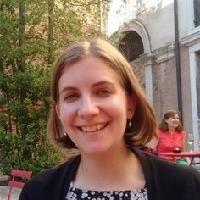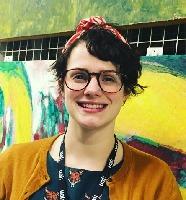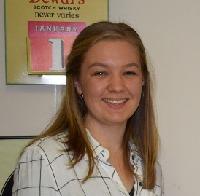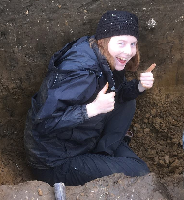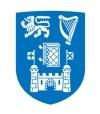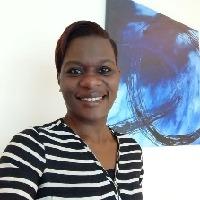Blog
Unless otherwise stated, content is shared under CC-BY-NC Licence
Reflections on the year
Laura Peaurt is a Digital Preservation Officer at the University of Nottingham.
This year I’m reflecting on the progress that Manuscripts & Special Collections at the University of Nottingham Libraries have been able to make during this challenging and unprecedented year to preserve our digital collections for future generations of researchers.
We have spent this year putting our new digital preservation system into action. This represents a great leap forward for us in terms of our ability to actively manage and continue to develop our growing digital collections. We have also successfully integrated the system with our Collection Management software meaning that in the future our end users should be able to access our digital records directly from the catalogue.
Our first steps have been to transfer our existing digital collections into the system for safekeeping including both digitised images and born digital collections, but we have also been able to spend some time actively collecting new digital content to document the university’s role in responding to the pandemic.
University of Bristol: World Digital Preservation Day blog post
Emma Hancox is a Digital Archivist at University of Bristol Special Collections and Theatre Collection
At the University of Bristol we have recently been working on improving our capabilities for digital preservation. Some of the activities we have been carrying out include developing a digital preservation policy, assessing ourselves against the DPC’s rapid assessment model and implementing Preservica as our digital preservation system.
Before the Covid-19 pandemic our efforts had mainly been focussed on dealing with legacy digital material in our archive collections and digital images created through past digitisation efforts. As for organisations across the country, the pandemic brought major changes to the teaching, management, and operation of the University of Bristol. As a response to this, we decided that it was important to collect records documenting these changes in our Special Collections archive so that future researchers could understand the University’s response. We also wanted our Coronavirus records to act as a complement to those being collected by other repositories nationally and internationally. We see this and the work being done by these other archives to collect Covid-19 related material as encapsulating the World Digital Preservation Day 2020 theme of Digits: For Good.
It’s not easy being green: Evaluating the impact of digital preservation
Elisabeth Thurlow is the Digital Preservation & Access Manager at the University of the Arts London.
As we challenge the long-held myth of neutrality within libraries, museums and archives, and diversify our collections, how do we avoid making decisions in support of digital preservation, which risk reinforcing historic biases? How do we select and prioritise our preservation actions whilst ensuring we are not duplicating existing biases? As well as the potential social impact of digital preservation, how green are our often IT-intensive digital preservation actions? How do we assess and minimise the environmental impact of our digital preservation programme?
These are not new discussions for my library and curatorial colleagues, who have been engaging in similar conversations in relation to their collections management practices over a number of years. But the inclusion of digital preservation in these recent discussions over the last two or three years is a strong indicator that digital preservation is becoming more embedded in our institutional culture. Collaboration is at the centre of many of these conversations - which is also central to the success of any digital preservation programme and our work at University of the Arts London (UAL).
Preserving Open Access Books: The COPIM Project
Dr Emily Bell is a Research Associate in Archiving and Preserving Open Access Books, at Loughborough University and Dr Gareth Cole is the Research Data Manager at Loughborough University. Both are members of the COPIM Project.
COPIM (Community-led Open Publication Infrastructures for Monographs) is an international partnership of researchers, universities, librarians, open access book publishers and infrastructure providers. It is building community-owned, open systems and infrastructures to enable open access book publishing to flourish.
As part of COPIM Work Package 7 (Archiving and Digital Preservation), we are researching the challenges and options for archiving and preserving open access books. As part of this we are running a series of workshops in 2020 and 2021 aimed at gaining a better understanding of existing best practice in the preservation of OA monographs, and developing possible solutions for the technical issues of archiving books, including embedded content and links. Our first workshop took place on 16 September 2020, jointly run with the Digital Preservation Coalition and was focussed on third party material. This workshop brought together representatives from the Archaeology Data Service, Cambridge University Library, Educopia, Internet Archive, Library of Congress, Los Alamos National Lab and Portico, as well as COPIM team members from Loughborough University, Open Book Publishers, the British Library, the DPC and Jisc.
Lancaster University: World Digital Preservation Day blog post
Thomas Shaw is the Assistant Director of Digital Innovation and Research Services at Lancaster University.
It is undoubtedly both a truism and an understatement that these are unprecedented times. Universities, along with other types of knowledge-intensive organisation, have experienced seismic shock and uncertainty due to the current pandemic, ranging from uncertain student recruitment to detrimental impact on research projects. Add to this the consequent financial effects, and the resulting circumstances do not appear to be conducive to making the argument for the importance of digital preservation and the need to invest in it.
In universities, there are currently two key barriers to making the case for digital preservation:
-
Financial constraints and uncertainty – the need for institutions to manage very challenging financial circumstances creates barriers to investment in either staffing or infrastructure for digital preservation. In most institutions, now will not be a good time to request new investment.
-
Organisational focus is elsewhere – universities have had to respond rapidly and adapt to the challenges of the pandemic. Institutions have had to transition to digital and blended modes of teaching, whilst managing key activity in other areas, such as preparation for the Research Excellence Framework. Consequently, senior leaders are unlikely to be receptive to calls for action on digital preservation at the current time, especially with so many other competing challenges.
“We never closed.” Digital continuity at the British Library during the pandemic
Michael Day is the Digital Preservation Research Lead at The British Library
In the not-so-distant past, if the digital preservation community in the west ever paused to think about the effects of viruses on digital collections and operations, I suspect that most would have been mainly thinking about computer malware or similar nasties. In fact, a couple of years ago, the digital preservation team at the British Library hosted Evanthia Samaras, from the Public Record Office Victoria and the University of Technology Sydney, to undertake a PhD placement to look at this very issue. Our research at that time didn’t find that much evidence of malware-risk in the Library’s collections, although we did find that we held a copy of a late-1990s computer magazine cover disk that had been published with a computer virus named “Marburg,” itself named after a human virus outbreak in Germany during the 1960s..
The British Library’s vulnerability to human viruses was not within scope of that particular study, but the implications of a global health pandemic became apparent very quickly during March this year. The Library’s physical sites were closed on the 26th March, part of a UK nationwide lockdown.
Digits: For Good
Samantha Case is an Assistant Archivist for the Whisky and Gin Archives at Bacardi based in Glasgow.
In its 158-year history, family-owned Bacardi has seen (and documented) many moments that have tested its resilience. From natural disasters to Prohibition to forced exile from its original homeland in Cuba – these stories from the past have shaped our culture and legacy. 2020 will mark another one of these challenging moments captured in our archives. Making sure the stories of today are preserved for generations to come is a tremendous responsibility made even more challenging during COVID-19 as situations shifted daily and countries found themselves in different stages of the recovery or closure.
Due to the sudden onset of the pandemic and the global scale of our company, it was vital that the archive team at Bacardi captured communications and changes in ways of working as rapidly as they happened. Our brand and company archives are spread out across four locations in the UK, France, Italy, and the USA, so we were well-placed to gather a range of records. Early on we mapped out the business records that we would need to capture to reflect any changes in working practices and the state of our business. It was important to consider how to best capture unique changes brought on by the pandemic, such as social distancing and temperature checks.
This situation emphasized how crucial digital records are to our company’s history. All the records relating to the pandemic were digital, which was ultimately useful because it allowed us to gather records from people even while unable to physically be in the office.
The exciting world of Metadata
Teagan Zoldoske is a Digital Archives Assistant at the Archaeology Data Service
Metadata is the data about data which is both as simple and complex as it sounds. Without proper metadata, data is useless. It can’t be used for verification, reuse, or anything else. But what really is metadata?
Metadata.
Something extremely important to the long-term health and reuse of data and yet the mere mention of it can cause people to shut off and run away. So, what is it, how is it different from data, and how could it be for good?
Metadata is the data about data. I think that sums it up quite nicely, don't you? Ok, let's phrase it a different way. It's essentially the documentation needed to make the data findable, understandable, and useable. It allows for verification of claims, reuse for future projects, and more.
Living in Lockdown: Archives of the Trinity Community in the Covid-19 Pandemic
Dr Jane Maxwell is Manuscripts Curator at the Manuscripts & Archives Research Library, The Library of Trinity College Dublin. Dr Brendan Power is Digital Preservation Librarian at The Library of Trinity College Dublin.
When the enormity of what the COVID-19 pandemic threatened fully dawned eight months ago, every research-active institute, lab, and repository began to ask ‘how can we respond to this in a manner which has long-term value?’. The archives profession was no different, concerned, as always, with ensuring that future researchers would have material upon which to base their enquiries. The Library of Trinity College Dublin, in collaboration with the Long Room Hub, the University’s arts and humanities institute, initiated a COVID-19 archives-collecting initiative. Focused very much on capturing individuals’ experiences of living in Ireland in 2020, the ambition of the initiative was three-fold; in the first instance we recognised that the private voice is a resource that is traditionally difficult to capture during major social upheavals. Secondly, we recognised that the recorded experience of a university community would represent a distinct snapshot of Irish life. Finally, in the early days at least, the Library saw this initiative as a valuable outreach activity, offering our community a concrete and valuable way to respond to the times we were going through.
Local Government Legislative process through a time of crisis, the story of Nairobi City County Assembly
Villy A. Magero is a Records Officer at Nairobi City County Government, Kenya and is a Member of Kenya Association of Records Managers (KARMA) and an Individual member of the International Council on Archives.
Introduction
The Kenyan political scene and system of Governance has been through a tumultuous time which birthed development and eventual promulgation of a new Constitution of Kenya 2010 (CoK 2010). The Constitution brought in changes in Governance right from the Central Government and more power was given to the people through devolution which birthed 47 Counties out which Nairobi City County is the 47th County in the Country. The County was operationalised by the County Government Act No. 17 of 2012 of the CoK 2010.
Currently the County of Nairobi has a total of 123 Members of the County Assembly 85 elected and 38 Nominated. They are charged with a responsibility of representing the local Nairobi resident at ward level. The County Assembly is established through Article 176 of the CoK 2010. The members of the Assembly sit on various committees that discuss issues touching on motions, petitions and any other matter that is presented to them as far the legislative process is concerned, they also offer an oversight role to the Executive arm of Nairobi City County. The Committees are the rooms where the actual dismantling of issues are broken down before they can be tabled on the floor of the Assembly to be passed as motions or bills for enactment in the County.


















































































































































